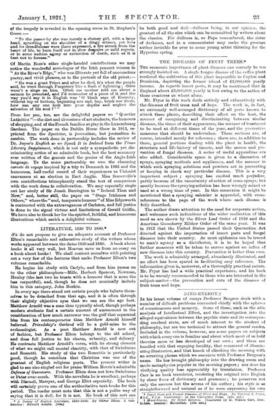LITERATURE, 1830 TO 1880.* ArE do not propose to give
an adequate account of Professor Elton's remarkable and exhaustive study of the writers whose works appeared between the dates 1830 and 1880. A book about books is all very well, but Heaven save us from an essay on a book about books I We shall content ourselves with pointing out a very few of the features that make Professor Elton's two volumes remarkable.
He begins his study with Carlyle, and from him passes on to the other philosophers—Mills, Herbert Spencer, Newman, Huxley (the last two he treats with a humour that is none the lees respectful), and, though he does not nominally include him in this category, John Ruskin.
In every age there stand out certain people who believe them- selves to be detached from that age, and it is often through their slightly objective eyes that we can see the age best. 'Matthew Arnold was a man thus typically aloof, though perhaps modern students find a certain amount of amusement in the consideration of how much narrower was the gulf that separated -him from his contemporaries than Matthew Arnold himself believed. Friendship's Garland will be a gold-mine to the archaeologist. As a poet Matthew Arnold is now out of -fashion, but Professor Elton belongs to the old school, and does full justice to his charm, urbanity, and delicacy He contrasts Matthew Arnold's verse, with its strong element of what we might call mental chastity, with that of Swinburne and Rossetti. His study of the two Rossettis is particularly -good, though he considers that Christina was one of the greatest of English religious poets. The present writer is glad to see also singled out for praise William Morris's admirable Defence of Guenevere. Professor Elton does not love Swinburne or Pater over-much. With the novelists he is excellent, perhaps with Disraeli, Marryat, and George Eliot especially. The book will oertainly prove one of the authoritative text-books for this period. The reader must note that this is not a polite way of saying that it is dull, for it is not. No book of this sort can
• A Survey of English Literature. 1830-1880. By Oliver Elton. 2 vole. -London: Edward Arnold. (32a.]
be both good and dull—dullness being, in our opinion, the greatest of all the sins which can be committed by writers about the classics. Fin- dullness is, as Pope remembered, the sister of darkness, and in a commentator may make the greatest author invisible for ever to some young artist thirsting for the Hyperion spring.










































 Previous page
Previous page